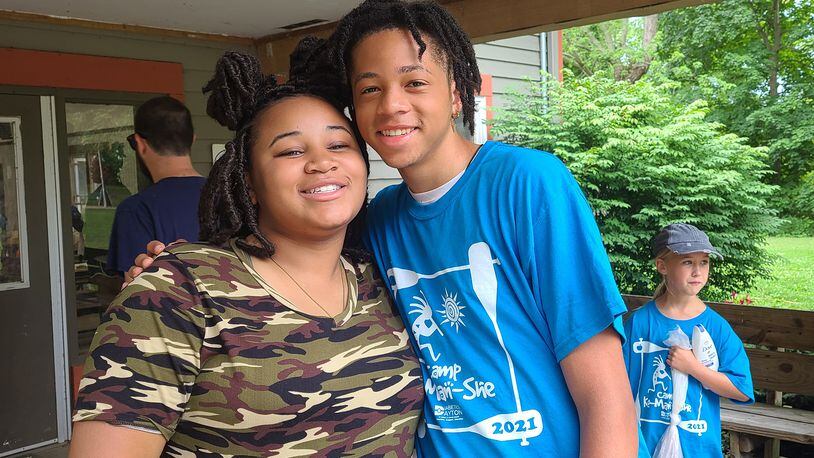“Malcolm just woke up one night at the camp complaining that he couldn’t breathe,” said his mom, Toylyn Blunt. “He thought he was having a heart attack.”
The camp medical team called paramedics who tested Malcolm’s blood sugar. It was more than 800 milligrams per deciliter. Normal blood sugar levels range from 80 to 140.
“I had been at camp for about a week and my symptoms started,” Malcolm said. “I was constantly thirsty but didn’t think much about it.”
The camp staff called Malcolm’s parents, who immediately started driving to the hospital near the camp. But Malcolm was soon headed home and to Dayton Children’s because his parents had asked that he be treated there in case of emergency.
“We turned around and met the ambulance at Dayton Children’s,” Toylyn said. “It was a shock to see Malcolm, who had lost nearly 20 pounds in a week!”
Malcolm’s parents were anxious to get a diagnosis. In the meantime, Toylyn relied on her recently completed nursing education, to give her clues.
“I had been talking to Malcolm regularly at camp and I was alarmed when he said he drank an entire case of bottled water in less than a week,” Toylyn said. “I started thinking diabetes then but dismissed it because he was so healthy.”
Doctors admitted Malcolm and worked to get his dangerously high blood sugar down to a normal range. He remained hospitalized for two days and was officially diagnosed with type 1 diabetes.
“Before Malcolm could be released, we all had to go through training,” Toylyn said. “We needed to learn about his nutrition and insulin information.”
The biggest difference between type 1 and type 2 diabetes is that patients with type 1 no longer produce their own insulin, while patients with type 2 produce insulin but their cells don’t respond to it properly. As a type 1 diabetic, Malcolm would need insulin injections for the rest of his life.
“I had to learn how to take care of myself when I was still in the hospital,” Malcolm said. “I didn’t think I would ever feel normal again.”
Malcolm’s fear eventually subsided. Now 17, Malcolm is managing life with type 1 well. Three months after he was diagnosed, he got an insulin pump with continuous glucose monitor (CGM), which monitors and helps him keep his blood sugar under control 24 hours a day.
While at Dayton Children’s, the family met Dr. Yelena Nicholson, a pediatric endocrinologist who specializes in children with type 1 diabetes.
Through Nicholson, Malcolm and his family learned about Diabetes Dayton, a local non-profit dedicated to supporting individuals affected by diabetes. They also learned about Camp Ko-Man-She, an annual summer camp for kids with diabetes, held at the YMCA Outdoor Center in Bellefontaine.
Nicholson discussed the benefits of attending the camp, but Malcolm was not overly interested, preferring instead to return to music camp.
“Finally, his doctor said that if he wanted to go back to music camp again, he would first have to go the Camp Ko-Man-She to see if he could handle his diabetes on his own,” Toylyn said.
Though camp would give Malcolm’s parents a much-needed break, Toylyn was reluctant at first to turn over the care of her son to others. But Malcolm thrived while away at camp.
“Diabetic camp was one of the best weeks of my life!” Malcolm said. “Camp taught me that not only am I a diabetic, but I’m also a person,”
During his first week at camp in 2019, Malcolm made lifelong friends, including his now best friend, Joseph Boop, who lives in the Bellefontaine area. The camp also teaches kids about diet and exercise and how to manage their disease.
Due to the Covid-19 pandemic, Camp Ko-Man-She was canceled in 2020, but this past summer, Malcolm returned and became a mentor to other type 1 diabetic kids.
“Now I don’t worry about Malcolm being away from me,” Toylyn said. “I only worry about him getting in trouble for doing normal teenage stuff without thinking first!”
Now a junior at the Greene County Career Center and studying engineering, Malcolm has an interest in a career in aerospace and going away to college no longer seems so scary.
“I still worry about it,” Toylyn said. “Because this is a chronic life-threatening disease, and he is a young person trying to manage it. It helps having support from people who are dealing with the same things. We all know the same struggles.”
For more information, log on to diabetesdaytoncamp.com
About the Author
